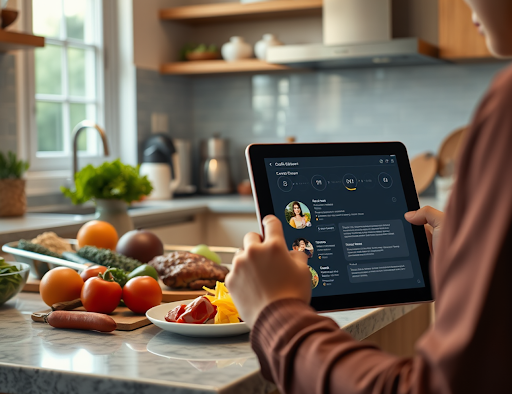Let’s face the fact—after a long workday, cooking dinner can feel like a chore. You’re tired. Your fridge looks like a random collection of ingredients. And takeout? Again? That’s not great for your wallet or your health. But what if AI could actually make cooking fun, fast, and personal again?
From recommending recipes to guiding you step by step with voice, AI is changing the way we cook. Whether you’re a busy professional, a beginner cook, or someone with special dietary needs, AI tools like AI audio are making home-cooked meals more doable than ever.
Personalized Recipes Based on What’s in Your Fridge
One of the biggest dinner dilemmas is figuring out what to cook with what you have. This is where AI shines.
AI can scan the ingredients in your kitchen and recommend meals that use them—no extra shopping needed. Tools like smart fridge apps or AI recipe generators use food recognition technology and recommendation algorithms to come up with creative, tasty dishes. Got spinach, half an onion, and eggs? You might get a spinach omelet with garlic toast suggestion, rather than wasting those ingredients.
This isn’t just convenient. It helps reduce food waste, which is good for your wallet and the planet.
Taking Preferences Seriously
AI doesn’t just throw random recipes at you. It considers your:
- Dietary preferences (vegan, keto, low-carb, etc.)
- Allergies (like gluten or nuts)
- Nutrition goals (high protein, low sodium, etc.)
Apps powered by AI can learn from your history. They adjust over time—so if you’re always skipping dishes with red meat, you’ll see less of those.
AI Audio as Your Sous-Chef
Now that you’ve got a meal idea, it’s time to cook. But what if your hands are messy? Or you’re new to the recipe?
That’s where AI audios come in. Think of them as your personal kitchen guide—reading the recipe to you, step by step. Besides, some tools support custom voice, you can try MiniMax out for this feature.
Real-Time, Step-by-Step Voice Help
These AI audio tools don’t just read recipes. They walk you through them. You might hear:
“Now add two tablespoons of soy sauce.”
And if you’re confused, you can ask:
“Can I use tamari instead?”
MiniMax AI audio will understand and answer in real-time, just like a cooking buddy.
Natural Conversation & Language Flexibility
Many AI assistants support multiple languages and can understand different accents. This makes cooking accessible across cultures and abilities. Whether you speak English, Spanish, or Mandarin, or have a thick regional accent, modern AI systems are trained to adapt.
Real-Life Scenarios Where AI Makes Cooking Easier
Let’s look at how this technology actually works in everyday life.
1. Quick Dinner After Work
You get home at 6 PM. You’re starving. AI scans your pantry, notes the bell peppers and leftover rice, and suggests a veggie stir-fry. You follow the steps through voice guidance while you change out of your work clothes. Dinner’s ready in 20 minutes—no stress.
2. Cooking Without Wasting Food
You’ve got produce about to go bad. AI spots the soft zucchini and near-expired yogurt and offers a grilled zucchini wrap with herbed yogurt sauce. No waste. No guilt.
3. Helping Visually Impaired Cooks
For people who are blind or have low vision, AI voice generators are game changers. With clear, spoken directions and real-time feedback, users can navigate the kitchen safely and confidently. Some systems even alert users if the oven is left on too long or food is burning.
What About the Human Touch?
AI is helpful, but it doesn’t replace the joy of cooking from your heart. Food is about culture, memory, and creativity. No algorithm can fully capture what it means to make your grandmother’s soup or your family’s secret BBQ sauce.
But here’s the thing—AI doesn’t have to replace those moments. It can support them. You can still cook the meals you love. AI just makes it easier to get there, especially when time or energy is low.
Final Thoughts
AI is quickly becoming the modern sous-chef—quiet, helpful, and always learning. With AI audio tools, even the busiest person can whip up dinner that feels homey, healthy, and personalized.
So next time you open the fridge and feel overwhelmed, just ask yourself: What if my kitchen could think with me? What would you cook tonight if AI planned it for you?
